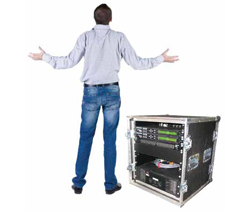
Finding Trouble
It’s more than useful to keep a small powered loudspeaker or a pair of headphones and a headphone amplifier close at hand. Equip them with XLR and 1/4-inch phone inputs so that you can check the presence of signal at the output of the console and beyond. Be ready to transfer the console outputs to the backup console if you’ve determined that the console is at fault.
For a live TV show or a mega tour, you can construct a passive changeover box that switches between one source to another in an instant, avoiding a scramble to identify and re-patch cables. If the console isn’t the offender, then rapidly move downstream with your listening gear to the other devices in the signal chain.
Failure Drills
Even if you deploy redundant equipment, you’ll need to be able to switch over to it in seconds, not minutes. This means that you, or a system tech, must know where everything is located, how the signal chain is patched, and what to do in a crisis.
Remember those fire drills in grade school? A well-led team should rehearse “failure drills” to the extent where everyone knows their role in getting the system back up and running as fast as possible, even if it’s only been partially crippled. A single initial failure can rapidly lead to another, depending on the nature of the problem. If nothing else, emergency announcements should always be available to venue management if they’re relying on the supplied PA rather than a house system.
Happy Endings
These days the build quality of most audio equipment is very good, so we tend to take it for granted that a given piece of electronics will just keep on shooting electrons through its circuits indefinitely. Unfortunately it won’t.
Whether it’s a year or even 50 years from now, sooner or later something will cease to function. If you’re lucky, it will be no more consequential than losing an aux send to your third-favorite reverb. If you’re not so lucky, the whole system may go dark.
When reasonable care is taken to forestall unpleasant eventualities, it usually means that they’ll never occur (Murphy’s Law, Chapter II, Section 1.102.3). But never let your guard down – Mr. Murphy may lie dormant for many years, but has yet to RIP.
Over the course of more than four decades, Ken DeLoria has provided sound design and tech support at hundreds live concerts and events, and as the founder of Apogee Sound, developed the TEC Award-winning AE-9 loudspeaker.
